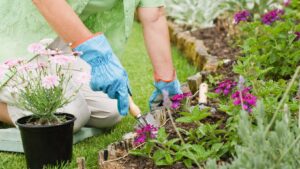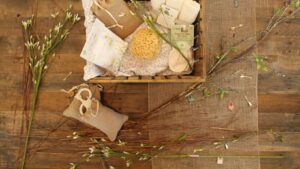
Organic farming and gardening are all the rage. If you dislike using products that are not fully organic, you’ll need to have a solid grasp of how to do so while keeping your garden as healthy as humanly possible. If you’re ready to start your organic gardening journey, you’ll first need to find organic mulch products to support your garden’s soil and plants. To help you, here is a guide to organic mulching (the right way):
What Exactly is Mulch?
Mulch is commonly defined as a layer of material applied to the surface of a bed of soil. Mulch is used to help conserve soil moisture and has many other amazing benefits. Mulch can be made out of an insanely varied amount of materials. Organic, inorganic, and other mulch types are used every day to perfect a garden’s health. Everything from dried leaves to rubber is used to make mulch products, after all.
What are the Benefits of Mulch?

Alongside conserving soil moisture, mulch is used to provide extra nutrients to a bed of soil. Soil can be hardened by the sun if it’s exposed to sunlight too frequently, so mulch is often used to provide a protective layer as well. Mulch delivery is booming thanks to how frequently gardeners need fresh, quality mulch products.
Mulch is commonly defined as a layer of material applied to the surface of a bed of soil. Mulch is used to help conserve soil moisture and has many other amazing benefits.
Depending on the type of mulch you use, the benefits can end up differing in a pretty astonishing fashion. Organic mulches are typically used to boost nutritional value in soil, while inorganic mulches help to artificially boost moisture and sun levels. By using the right type of mulch in your garden, you can unlock your garden’s full potential (no matter what you might be growing).
When Should I Add Mulch?
Mulch is best added to gardens when the soil is overexposed or when your current layer of mulch is beginning to thin. If you’re using organic mulch products, they will need to be replenished fairly frequently. For inorganic mulch products, some options only need to be replenished once a year (and sometimes even less than that). For people who love to save extra money on their gardening expenses, inorganic mulch is often the best option. If you want a naturally beautiful-looking garden, however, organic mulch is often the best way to go.
The 4 Best Types of Organic Mulch:

Because we’re focusing on organic mulch in this guide, the recommendations we’ll be giving out are all strictly-organic mulch products. Each of these four products can hypercharge the nutrients in your garden and help you unlock a unique look for your soil bed. They are as follows:
Straw Mulch
Straw is one of the simplest organic mulch products out there. If you’re living on a farm, you can even use any leftover straw to help your garden grow in a healthy, safe manner. If you’re not on a farm, you can buy a huge amount of straw in bulk for cheap. That being said, straw decomposes quickly, so you’ll need to replace the straw in your soil bed frequently.
Compost Mulch
Composting is hyper-popular among people who prefer to use organic products. The fact that you’re recycling already-used materials when using compost-type mulch will be appealing to many people, after all. Compost mulch can come in many different forms. Animal manure, newspapers, food scraps, and other types of compost can be used to create compost mulch products.
Shredded Bark Mulch
Perhaps the most common mulch product, shredded bark mulch, is typically what people envision when they think of “mulch.” The fact that shredded bark mulch is incredibly inexpensive has made it that much more popular. Shredded bark is environmentally-friendly and has a hyper-natural look that will blow you away. You can order this mulch product in many different colors as well. The sheer versatility of the product makes it a solid choice for any home or commercial gardener.
Mulch is best added to gardens when the soil is overexposed or when your current layer of mulch is beginning to thin. If you’re using organic mulch products, they will need to be replenished fairly frequently.
River Rock Mulch
If you want an inexpensive and classy-looking mulch product, river rock mulch is a fantastic option to consider. There are easy ways to get tons of bulk river rocks to use as mulch, and the product only needs to be occasionally replaced, making it incredibly budget-friendly. If you’re planting flowers and other easy-to-care-for plants, river rock mulch can get the job done with ease.
Keep Your Gardening Efforts Organic in 2022
With this guide, you can keep your gardening efforts completely organic in 2022. Never cut corners with your mulch products, as this can significantly decrease your garden’s health. Being up-to-date with replacing organic mulch is particularly important, as rotted and heavily decomposed organic mulch can actually pose a threat to your garden in the long run.












